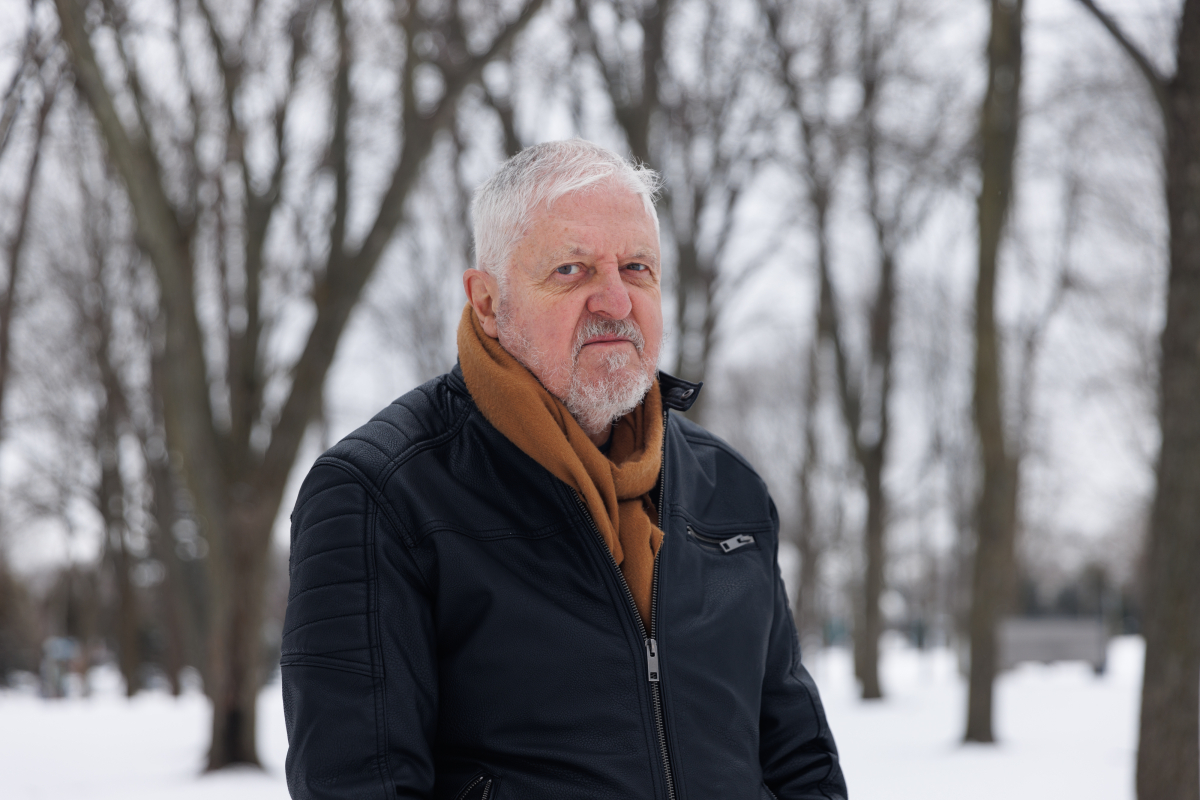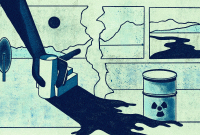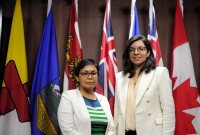Support strong Canadian climate journalism for 2025
Martin Bush has managed national parks in Madagascar, survived a bomb attack while working on a renewable energy project in Sudan and written three books. But these days, much of his energy is focused on offshore wind in Atlantic Canada and how its potential could change the trajectory of a region now reliant on coal and nuclear power.
His interest in renewables was sparked in the 1980s in Alberta while teaching chemical and mechanical engineering at the University of Calgary, where the prime focus was “oil, gas and the tar sands.” However, architects at the school were already talking about passive solar heating for homes, where buildings are constructed from materials that store and transmit heat from the sun.
Sitting in the cold Alberta winter, Bush became more and more interested in renewables, opting to take work at the University of Florida, where he became the administrative director for the Training in Alternative Energy Technology program. During his time in Florida, he learned a lot from co-worker and professor Erich Farber, a renewable energy pioneer who developed important solar technology and helped design the Saturn 5 rocket, which sent people to the moon in the 1960s.
At the time, renewables were still cutting-edge and expensive, unlike today where solar and wind are considered the cheapest forms of energy.
“Over the years, you know, the whole thing changed. And now, wind and solar are cheaper than nuclear,” said Bush.
“Now governments should absolutely be focused on renewable energies. No question about it.”

The program in Florida focused on renewable energy training and was funded by the United States Agency for International Development (USAID).
So, Bush headed to work overseas and was soon managing a renewable energy project in Djibouti; he also co-wrote a National Energy Plan for the country. Although renewables weren’t cost-effective on a large scale, for communities not connected to a power grid, they were a quick and logical solution. One of the main uses of solar and wind was to pump water, which had previously been done by hand in many cases.
There were adventures along the way. In 1988, a few weeks after arriving in Khartoum, Sudan, to work on a renewable energy project, he survived a deadly bomb attack at the Acropole Hotel. This terrifying close call caused damage to his eardrums, which eventually healed after an operation back in the United Kingdom, where Bush is originally from.
A few months later, he returned and finished his position leading the project, a two-year stint that also focused on solar-assisted water pumping, as well as training young engineers in renewables.
Then, after working in Mali for four years, he began a new chapter managing national parks in Madagascar, where valuable species like ebony trees were targets for poachers, who also preyed on lemurs. Forested parkland being cleared for agriculture was also a threat.
“We got people coming in at night and chopping them down and there's a lot of illicit and illegal forestry going on often by the forestry department. That was part of the difficulty, as well,” said Bush.
Forestry practices continue to threaten biodiversity in Madagascar today: a 2017 study found “a combination of political instability, government mismanagement, a lack of forest operation controls and a failure to impose punitive penalties on well-known traffickers contributed to what was effectively zero control over the management of precious timber resources” for a five-year period leading up to 2015.

Bush also travelled to Guinea, Haiti and Egypt for work. In his memoir, Isabelle’s Bat, he details stories from the countries: an armed attack on his home in Conakry; being in Haiti during 2010’s catastrophic earthquake.
However, he said, “there were a lot of good things going on as well that I really enjoyed… These countries are brilliant. Madagascar was wonderful.”
Bush’s interest in climate solutions eventually took him full circle to Canada a few years ago. He now lives in Brossard, a city in the Montérégie region of Quebec, where he thinks a lot about the neighbouring Atlantic provinces. He continues to consult on climate policy and renewable projects.
Specifically, New Brunswick, a place he has actually never been. The province is home to Point Lepreau, one of four nuclear power plants in Canada. The plant, which recently received a licence extension allowing it to operate until 2032, has been criticized for its unreliability and for the nuclear waste, which is now stored on-site but will need to be moved in coming years. The site, when operational, supplies around 40 per cent of the province’s power, while hydro (22 per cent), natural gas (15 per cent) and coal (14 per cent) make up the rest.
The province is betting partially on SMRs, or small modular reactors, to replace power from the aging nuclear plant and power from coal (its Belledune coal plant needs to shut down, along with all other coal-powered power plants, by 2030). However, the tech is experimental: no one has successfully built an SMR, and they’re extremely costly when compared to renewables.
To Bush, the answer to New Brunswick’s energy needs is sitting right there in front of the nuclear power plant: the Bay of Fundy. A recent op-ed he wrote for the NB Media Co-op, suggesting the province swap nuclear for wind energy, grabbed the attention of local clean energy proponents.
In the article, Bush noted the Atlantic coast of the United States has a wind power potential 10 times greater than the power generated by all of Canada’s Eastern provinces, which means “the wind resources are just huge” for the region, while hydropower from Quebec has the potential to store the clean energy from wind, along with other renewables like tidal. Although plans are underway for the Atlantic Loop, an energy corridor that would connect Atlantic provinces with hydropower from the province as well as Labrador, the project faces obstacles and a study shows it will still be important for provinces like N.B. to produce its own clean energy.
His article, which broke down how a coal- and nuclear-free future is possible for the province, “generated considerable discussion and interest,” said Susan O'Donnell, a University of New Brunswick researcher and member of the Coalition for Responsible Energy Development.
“He has a very collaborative approach. It would be great to work together to cost out an offshore wind development for the province that we could present to the public as an alternative to costly and speculative new nuclear reactors,” said O’Donnell.
After a long career spanning multiple industries and countries, Bush is determined to help tackle the unique plight of the Atlantic provinces and says he is planning to stay in Canada with his family.
“You know, I'm just continuing writing and … helping out with the environmental groups, both in Ontario, Quebec, and also New Brunswick, as well,” he said, which includes a book in progress on the interconnection between the climate and biodiversity crises.
And in terms of a trip to N.B. to see the powerful offshore winds of the Atlantic Ocean?
“I'd like to do that.”






Comments
Does anyone else remember this term/concept coined by Amory Lovins at the Rocky Mountain Institute: negawatts? "It represents a watt of energy that you have not used through energy conservation or the use of energy-efficient products."
It's clear that no one has any intention of walking back our carbon-intensive industrial economy. So (pretending it's not too late), I think we should begin every conversation about the energy transition with the caveat that we must first reduce all energy wastage before we figure out how much renewable energy infrastructure we need.
To illustrate (from renewableenergyworld.com): "The US wastes 61% to 86% of the energy it generates. In other words, it wastes more of the energy that it generates than it actually uses. And that’s without taking into account energy wasted in homes and businesses!"
Calculating how much energy we *don't* need is at least as important as calculating how much energy we do need.
Agreed, but one needs to be very careful with the language. One can not ‘generate’ energy. One can only convert it from one form to another; this is a consequence of how the word ‘energy’ is defined. For example, in a gasoline-powered automobile the chemical energy of the gasoline is first converted into thermal energy as it is burned, and then into mechanical energy as the hot gas pushes a piston, thus causing the car to accelerate. In practice only about one quarter of the gasoline’s chemical energy is converted into mechanical energy; the rest is thermal energy, which is why the engine and exhaust gases are hot.
Can one do better? Every first year physics student is taught that there is a maximum limit to the fraction of thermal energy that can be converted into mechanical energy; this fraction depends on the temperatures of the hot and cold parts of the system; it is called the Carnot efficiency. The efficiency is maximized by having the hot part as hot as possible, and the cold part as cold as possible. The temperature of the hot part is limited by the properties of the available material; the temperature of the cold part is limited by the coldest fluid (air or water) available. This is why gasoline engines, diesel engines, coal, gas and nuclear electrical generating plants are all inefficient.
Fuel cells are much more efficient because they convert chemical energy directly to electrical energy.
Mechanical energy can be converted to electrical energy, and vice-versa, with almost 100% efficiency.
Whenever anybody says that renewables are cheaper than nuclear , all I hear is somebody pushing for an increase in natural gas. Without storage for renewables, natural gas is required to tie the energy to the grid and it is the storage medium that makes renewables so expensive. Indeed, without a storage medium, wind and solar should not be called "renewable" at all; how about "natural gas collusion energy". Once upon a time, we were promised that natural gas was just a bridging fuel until the storage issue got sorted out. The span that bridge has to cross gets longer every year and will soon be out of sight. Whatever happened to good old energy conservation?
“.... while hydropower from Quebec has the potential to store the clean energy from wind, along with other renewables like tidal. “
This does not make sense. I suspect what the writer meant to say is that the hydropower can provide power when the wind is not blowing, there is no tidal current, and so on.
It has the "potential" to store energy - not that it is going to. For the last 12 years Ontario has been told the same thing. It hasn't happened and we are stuck with natural gas instead of storage.
Yup, it's pretty clear that wind, water and solar will be the power generators of this century. The article mentioned using Quebec's hydro reservoirs for storage and there are also many other cheap storage options available and coming. With storage to balance the grid, NB won't need expensive fossil fuels or expensive slow dirty nukes.
"... also many other cheap storage options available and coming..." - been hearing this for a dozen years now. "We'll get rid of natural gas once storage come on line - it's just a bridging fuel". As time goes on, the span the bridge needs to cross is nowhere in sight and keeps getting longer. The natural gas companies have been fooling us for too long.
Keep at Martin! We need you